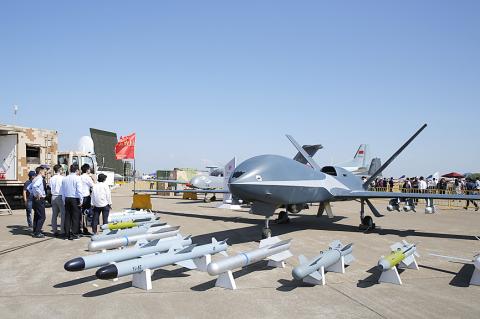Chinese bombers. Chinese hypersonic missiles. Chinese cyberattacks. Chinese anti-satellite weapons.
To a remarkable degree, the Pentagon budget proposal for next year is shaped by national security threats that Acting US Secretary of Defense Patrick Shanahan has summarized in three words: “China, China, China.”
The US is still fighting small wars against extremists and Russia remains a serious concern, but Shanahan seeks to shift the military’s main focus to what he considers the more pressing security problem of a rapidly growing Chinese military.

Photo: AP
This theme, which Shanahan outlined on Thursday in presenting the administration’s proposed defense budget to the US Senate Armed Services Committee, is competing for attention with narrower, more immediate problems, such as US President Donald Trump’s effort to use the military to build a border wall.
Shanahan is hardly the first defense chief to worry about China.
However, he sees it as an increasingly urgent problem that exceeds traditional measures of military strength and transcends partisan priorities.
“We’ve been ignoring the problem for too long,” Shanahan told a US senator.
“China is aggressively modernizing its military, systematically stealing science and technology, and seeking military advantage through a strategy of military-civil fusion,” he wrote in prepared testimony to the committee, which is considering a US$718 billion Pentagon budget designed in part to counter China’s momentum.
The US$25 billion that the Pentagon is proposing to spend on nuclear weapons, for example, is meant in part to stay ahead of China’s nuclear arsenal, which is much smaller than the US’, but growing.
Shanahan said China is developing a nuclear-capable long-range bomber that, if successful, would enable China to join the US and Russia as the only nations with air, sea and land-based nuclear weapons.
Shanahan ticked off a list of other Chinese advancements — hypersonic missiles against which the US has limited defenses, space launches and other space efforts that could enable it to fight wars in space, “systematically stealing” of US and allied technology, and militarizing land features in the South China Sea.
Bonnie Glaser, director of the China Power Project at the Center for Strategic and International Studies, said that the US has been lacking effective strategies for competing with China on a broad scale.
“It is overdue,” she said of the Shanahan focus. “We have been somewhat slow in catching up” in such areas as denying China its regional ambitions, including efforts to fully control the South China Sea, which is contested by several other countries.
However, some defense analysts said Shanahan and the Pentagon have inflated the China threat.
“I do think it’s worth asking what exactly is threatening about China’s behavior,” said Christopher Preble, vice president for defense and foreign policy studies at the Cato Institute.
He does not discount China as a security issue, including in the South China Sea, but doubts the US military is the institution best suited to deal with such non-military problems as cyberintrusions into US commercial networks.
Competition with the Chinese is not mainly military, Preble said.
“I still don’t believe the nature of the threat is quite as grave as we’re led to believe” by the Pentagon, he said. “They tend to exaggerate the nature of the threat today.”

The CIA has a message for Chinese government officials worried about their place in Chinese President Xi Jinping’s (習近平) government: Come work with us. The agency released two Mandarin-language videos on social media on Thursday inviting disgruntled officials to contact the CIA. The recruitment videos posted on YouTube and X racked up more than 5 million views combined in their first day. The outreach comes as CIA Director John Ratcliffe has vowed to boost the agency’s use of intelligence from human sources and its focus on China, which has recently targeted US officials with its own espionage operations. The videos are “aimed at

STEADFAST FRIEND: The bills encourage increased Taiwan-US engagement and address China’s distortion of UN Resolution 2758 to isolate Taiwan internationally The Presidential Office yesterday thanked the US House of Representatives for unanimously passing two Taiwan-related bills highlighting its solid support for Taiwan’s democracy and global participation, and for deepening bilateral relations. One of the bills, the Taiwan Assurance Implementation Act, requires the US Department of State to periodically review its guidelines for engagement with Taiwan, and report to the US Congress on the guidelines and plans to lift self-imposed limitations on US-Taiwan engagement. The other bill is the Taiwan International Solidarity Act, which clarifies that UN Resolution 2758 does not address the issue of the representation of Taiwan or its people in

US Indo-Pacific Commander Admiral Samuel Paparo on Friday expressed concern over the rate at which China is diversifying its military exercises, the Financial Times (FT) reported on Saturday. “The rates of change on the depth and breadth of their exercises is the one non-linear effect that I’ve seen in the last year that wakes me up at night or keeps me up at night,” Paparo was quoted by FT as saying while attending the annual Sedona Forum at the McCain Institute in Arizona. Paparo also expressed concern over the speed with which China was expanding its military. While the US

SHIFT: Taiwan’s better-than-expected first-quarter GDP and signs of weakness in the US have driven global capital back to emerging markets, the central bank head said The central bank yesterday blamed market speculation for the steep rise in the local currency, and urged exporters and financial institutions to stay calm and stop panic sell-offs to avoid hurting their own profitability. The nation’s top monetary policymaker said that it would step in, if necessary, to maintain order and stability in the foreign exchange market. The remarks came as the NT dollar yesterday closed up NT$0.919 to NT$30.145 against the US dollar in Taipei trading, after rising as high as NT$29.59 in intraday trading. The local currency has surged 5.85 percent against the greenback over the past two sessions, central